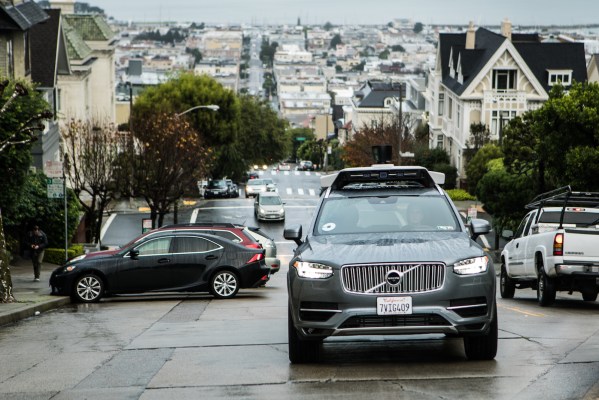Uber has confirmed that its small fleet of autonomous vehicles in San Francisco will be back on the road today. The company grounded its entire self-driving test fleet in the U.S. on Saturday, following an accident involving one of its vehicles in Arizona earlier in the day.
“We are resuming our development operations in San Francisco this morning,” an Uber spokeswoman told us this morning.
The spokeswoman also confirmed Uber’s autonomous cars in Arizona and Pittsburgh remain grounded, but said the expectation is for them to shortly be back on the roads too.
Uber grounded all its self-driving test cars following the accident, initially suspending the operation in Arizona but also in the two other cities where it is currently testing the vehicles, San Francisco and Pittsburgh, pending the outcome of an investigation.
While Uber’s self-driving cars are able to drive autonomously, the test vehicles include a human driver sitting in the passenger seat so they are in a position to take over should it become necessary.
The two vehicles it’s testing in SF are apparently at a different stage of development versus the 12 test cars apiece it’s been piloting in the other locations — explaining why it’s feeling confident enough to return to the road in SF but not yet elsewhere.
Early reports of the Arizona incident appear to have cleared Uber’s technology of blame, with local police saying the accident occurred because a normal (i.e. human-driven) vehicle failed to yield to the Uber, which was in self-driving mode at the time.
The company’s self-driving test program has, however, previously faced safety-related criticism — including when one of the vehicles apparently ran a red light. In that instance, Uber claimed the car had not been in self-driving mode at the time — though a New York Times report, citing two Uber sources, has suggested the opposite.
Beyond questions over the safety of its self-driving tech, Uber continues to face wider criticisms relating to its company culture — with accusations of sexism by a former employee continuing to pile pressure on the leadership (and apparently contributing to the decision of president Jeff Jones to leave the company earlier this month, amid the turmoil).
